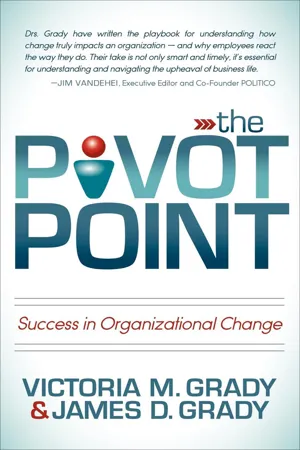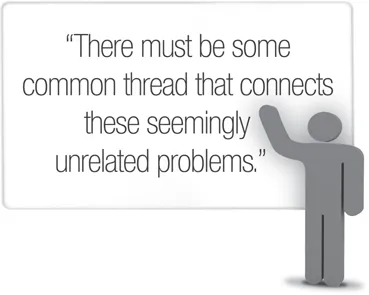![]()
The Story: Looking Beyond Resistance
It was a dark and stormy Saturday night in Washington, DC, and it was growing darker. The conference at a hotel in the Chinatown district had been canceled, but not everyone could make it out before the hurricane hit. The hotel staff and a few family members were huddled together in a remote corner of the lobby, where faces were lit sporadically by flashing lightning. A few of the remaining conference participants were gathered in a nearby conference room, with quiet conversations starting and then trailing off, unfinished. The hurricane wasn’t the only thing on their minds.
Suddenly, a deafening crash of lightning illuminated the tall windows, and they heard a sickening crack. Everything went black. Someone screamed. Then one of the hotel staff stood up and called, “Marie? Marie, where are you?” His four-year-old daughter was nowhere to be found. The small group of guests and staff split up and began searching blindly in the lobby and connecting dark corridors. A half hour later, the girl had still not been found. “What if she went outside?” her father said, in a panic. Pulling his keys from his pocket, he started to unlock the door leading to the patio, when he saw two flashlight beams bobbing toward him in the darkness and heard a voice call out: “We found her—don’t worry, she’s just fine,” it said, clearly holding something back. “Just come with us, you really need to see this!
> > > > >
Just a few days earlier, the weather was clear and spirits were high. The first conference of the International Society for the Study of Organizational Management (ISSOM) had begun Wednesday evening with great fanfare and excitement. Based on the conversations at the reception that night, it was evident they were drawing many of the best and the brightest from second-and third-tier management. Sponsored and coordinated by a distinguished group of business, industry, and government organizations representing seven countries, ISSOM’s membership process was stringent; employers had to first nominate prospective members, and then nominees’ credentials were further scrutinized before the committee issued the invitation to join. The conference organizers were also delighted to notice the wide variety of organizations that were represented. The conference theme was “Management, Leadership and Change in the Global Economy”. With the breadth of expertise represented here, it promised to be a productive event that could establish a strong reputation for the organization.
The conference would run from Wednesday evening to Sunday at noon. So far it had been running fairly smoothly, with participants engaging energetically with each other between sessions. But on Friday morning, a hurricane in the Atlantic took a sharp turn towards the east coast of the United States, with its most likely path centering on Washington, DC. By Friday noon, the hurricane was projected to strengthen further, and enter the metropolitan area on Saturday evening with a vengeance. Greatly disappointed, the conference planners resigned themselves to cancelling the rest of the conference. That afternoon, they announced that the conference would officially and prematurely end after the last speaker of the day. Participants rushed to change their travel plans.
By the time the last speaker took the stage later Friday afternoon, only half of the participants were left. But despite the distractions, the speaker, Dr. William Bankston electrified his audience with an informative presentation titled “Mystery on the Organizational Express.” His presentation was as full of unanswered questions as it was of candor, spontaneity, and a dry sense of humor as big as his home state of Texas. Unfortunately, this just made the premature conclusion of the conference feel all the more unfinished, as its potential value was waved like a white flag once more before the audience. The breakout group sessions with the afternoon’s speakers that were to follow had been cancelled. The remaining conference attendees prepared for departure.
> > > > >
“Hey, Edward,” a young man shouted over his shoulder, luggage in hand, as he was walking through the front door in the hotel lobby, “I’ll see you next week at Harry’s, okay? Be smart and stay safe.”
A tall, rather thin, man, with unkempt blond hair, self-consciously stepped away from the group he was with and shouted back, “Just don’t send me one of those ‘wish you were here’ messages after you get back to England tomorrow!” He noticed as he turned back to the group that one or two had been startled by the volume of his voice—he had been a bit startled by it himself. Sheepishly, he explained in lower tones, “He lives in a neighborhood near me. I think he got the last ticket home.” Under his breath, he added, “He’s always been a lucky *&#!”
The conference registrar was conferring with another group of sponsors and speakers who were also startled at the outburst. After another moment, the registrar left his group and walked up to the other group, consisting mostly of anxious attendees who, like Edward, still hadn’t finalized their travel plans. “I hope you understand that we have done all we can to get you out of here in a timely fashion,” said the registrar apologetically. “Still, even though you were unable to reschedule your departure for today, I trust that you will all be able to leave before they close the airport tomorrow afternoon.”
One man, an African American wearing a dark brown suit and a tan knit shirt, spoke up. “Well, it seems most of us will be able to get out, but there are a few who couldn’t reschedule their travel plans and have to wait until Sunday—that is, if the hurricane will let them.”
“Wait here just a moment,” the registrar said, and he walked back over to the group of speakers and sponsors, getting ready to leave. After a brief discussion, all shook hands and dispersed—except for that day’s last speaker, Dr. Bankston, who was now standing alone, holding a stack of folders.
Dr. Bankston walked over to the group, smiling enigmatically. “So, I hear y’all are stranded too, for the time being. How about you join me for breakfast tomorrow morning, here at the hotel?”
A sudden crash of thunder resounded throughout the lobby—nothing could have provided a better punctuation mark for the astonished looks on the faces of those in the group at that instant. But one by one, they responded, “Sure.” “Yes, I can do that.” “Why, thank you; that would be fine.”
Dr. Bankston nodded in approval and headed toward the elevator, leaving the remaining participants wondering about the nature of this unexpected meeting.
Saturday Morning—7:56 a.m.
The next morning, a young woman dressed in a dark gray suit and discreetly ruffled blue blouse was the first to arrive in the lobby. Almost as soon as she stepped out of the elevator, a hotel employee from guest services, holding a bag, greeted her. “One of Dr. Bankston’s guests?” she asked pleasantly. “Yes, I am,” she replied, a little uncertain. “I’m Joan.”
The woman did not identify herself by name, but replied, “You’ll be dining in the courtyard this morning—follow me, please.” Joan followed her outside where the air was heavy with impending rain. But the chorus of natural sounds and the clatter of dishes were a welcome change from the suddenly silent hotel.
The lady from guest services gestured to a table, and as Joan sat down, she opened the bag and began distributing small gift boxes, wrapped with a blue ribbon, at each place setting. “Your host asked me to make sure each of you got one of these,” she said, smiling again. After she had placed the final one at the head of the table, she said, “Enjoy your breakfast,” and returned to the lobby.
One by one the other guests arrived, guided by the same guest services representative. Soon most of the sixteen chairs around the patio tables were filled, with the one at the head conspicuously vacant. “I wonder what these are—tickets home?” joked a woman with vaguely Asian features, picking up the gift box on her plate. Joan forgot—she was the only one who had seen the hotel employee distribute these packages. “Oh, of course. A woman from guest services gave these out—she said they were from Dr. Bankston. I was assuming he’d be here himself to explain them.”
As if on cue, they heard footsteps and a brief conversation outside the door. Dr. Bankston walked out onto the patio with a bit of a flourish and then said, “Oh, good, you’re already here. Let’s get started, shall we?” It was 8:00 a.m.
Dr. Bankston’s reputation in the field of management was legendary. Even if the attendees hadn’t seen his presentation yesterday, they would have known that he was both a respected educator and a well-known consultant in high demand in business and industry. He was known as idiosyncratic, tireless, and obsessive (if unconventional) in his pursuit of solving the “unsolved mysteries” of past, current, and future management theory. He seemed to have mastered the art of being just enough in control to be feared, and just approachable enough to be revered. In truth, he had volunteered to personally work with the stranded conference participants—not just because he was stranded too, but because he felt there was still some unfinished business introduced but not resolved by the conference sessions.
He said to the group, “I have in my hand a folder with receipts for all the prepaid hotel services, which includes food and lodging. The lodging was for yesterday’s and today’s speakers, and the food services include last night’s cancelled reception and tonight’s cancelled dinner banquet. Considering it is all prepaid and these payments are not refundable, we have the challenge of meeting, eating, and lodging to our heart’s content. I surmise some of you will be leaving for the airport shortly, so consider this your bon voyage breakfast, and best wishes for an uneventful trip home. For those of us left stranded, I say we eat, drink, and be merry, at least until tomorrow afternoon when all of the vouchers will become invalid. Perhaps in the meantime, if we can shed a ray of light or two on the “mystery” I discussed yesterday, so much the better.
“Oh,” he said as an afterthought, “as for the little packages—as a favor to me, please keep them with you. They each possess a charm to ward off the ill effects of the hurricane. But don’t open them, or the charm will surely escape.”
He stood, and then with an exaggerated wave of his hand, several servers paraded out onto the patio with tray after tray of breakfast food. “I’ve always wanted to do that,” he said with a chuckle. “After we eat, let’s break for an hour. Several of you will still need to get to the airport this morning; if you are already packed, then there is plenty of time for you to have a bite to eat. While you are here, and if you will pardon me if I speak with my mouth full, I will try to answer as many of your questions as possible. I’m told the van will be out front by the time you finish. For those of you who, like me, are here for the duration, I’ll be back in the conference room at about 10:00 a.m., that is, if any of you are interested in contemplating a management topic of great significance.”
He glanced around at the business attire of his guests. “One suggestion: casual is the dress of the day—hell, I didn’t bring anything comfortable myself, so I may just wear my pajamas,” he chuckled. “We will begin with the establishment of an agenda when we return. I think determining mealtimes,” he said, as he finished off a pastry, “should be the first order of business, don’t you agree?”
There was much food consumed and no small amount of nervous energy expended as the clouds got lower and more menacing over the patio. Conversations were mostly superficial and storm focused, quite unlike the conversations Dr. Bankston had overheard over the past few days. The story was always the same; organizations had a sense of a haunting restlessness that was perhaps similar to the restlessness in the assembled group due to the approaching hurricane. Much of the time the lower-level employees were distracted and unaware of the danger signs, or, if aware, they had chosen to ignore the signs. Many of those who were in decision-making positions were at least vaguely aware of the problems, but had no clue as to the origin.
The general sense of organizational melancholy, happening in different parts of the organization and in different parts of the globe, is too consistent to just be coincidental, Dr. Bankston had thought. There must be some common thread that connects these seemingly unrelated problems. The detective in him was already at work.
Finally the last few stragglers finished eating, politely offered their thanks, and those with planes to catch headed straight to the waiting airport shuttle.
Dr. Bankston leaned back in his chair, surveying the empty table. Then he sat up, drained his coffee cup, wiped his mouth one last time, and stood up. He had some time to kill before ten o’clock.
He had been particularly troubled by the unrest in the organizational world, but for the first time in several days, as he wandered around isolated corridors, his thoughts shifted to the growing feeling of unrest inside himself. He had first noticed it several years ago. Old age, he had decided, and looked no further—until recently. It re-emerged three months ago, about the time his home computer had crashed. It was an old friend of many years, helping him produce scores of presentations and papers, and two—nearly three—books. His computer had seemingly developed a persona, and he had even given it a name: “Betsy.” But all of a sudden, Betsy had died, right in the middle of writing his third book, which still remained unfinished. For some reason he thought back to that moment in time when he first noticed a lingering sense of annoyance—he had even felt anxious in his little home office. Although it was just a small corner of the basement, it had always been for him a sanctuary. He was not particularly superstitious, but … if only that damned computer had not died. No, that was silly; its replacement was much faster and more capable than Betsy…
He refocused his attention. Now, getting back to the real problem at hand: what is going on in the organizational world? How can I work with this group in order to get a better impression of the problems they confront? Where can I gain some insight into this mystery? As he was lost in thought, he almost stumbled into one of the participants. Somehow he had found his way back to the door to the conference room. “Excuse me,” he said apologetically. “I was lost in thought.”
“Me too, Dr. Bankston; sorry for not watching where I was going. My name is Hilde,” she said with a slight German accent and added, as a crimson blush enveloped her neck, “and I really do appreciate your willingness to share time with us.”
“My pleasure, Hilde—nice to meet you. Shall we go in?”
The Introductions—10:00 a.m.
Following Hilde, Dr. Bankston entered the room with purpose and took his seat at the head of the table. “Well, it seems that I have run most of you off,” he stated energetically. Out of the fourteen participants that showed up for breakfast, it appeared ten had departed for the airport. “But this size is really better. Why don’t we begin with introductions and—uh-oh, looks like we have a late arrival—well, sit down and join the crew. I was saying … how about each of you tell us a little about yourself and your organization?
“But before you begin your introductions, let me first be honest with you. I am troubled by what I have overheard at this conference over the past few days, which also reflects what I’ve seen in my own recent work. Apparently storm clouds are gathering over business and industry, and no one seems to know how to determine the source of the problem. I guess hurricanes are easier to figure out than “organizational storms”.
“The truth is, shedding some light on this mystery has become a preoccupation of mine, and I hope you can help me gain some insight into the situation. So to the extent you are comfortable sharing your feelings and insights, please be as honest as you can with yourself and with us. It will be helpful if you tell us about some of the challenges that you are personally confronting at work, and also about the challenges faced by your organization in general. Also, if you will, please include in your comments your personal vision and your vision for your organization. I’m looking for clues that may lead us to some answers.
“Who wants to start us off? You there, late arrival, I saw you speaking for others in the group last night. Will you go first?” he said, gesturing toward the man, dressed in a button...



